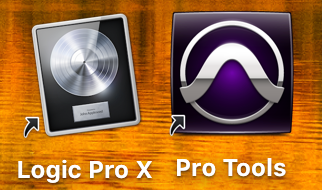Hey everyone,
Logic and Pro Tools. I have many years of experience with these workstations for both personal, and commercial use. You may find this useful as you decide which software to purchase or, if you already own these products, perhaps this article may change your approach on how you use them. I recognize that these are not the only two competitive DAWs out on the market, but they are the two that I have the most experience with.
thanks for taking the time to read what I have to say about two widely used DAWs in today's #music and #recording industry:

The Obvious
To begin, let's point out the most obvious differences between the two workstations. Pro Tools is going to cost almost three times as much as #Logic, and require almost three times the amount of hard drive space to install. If you are a student, you may purchase Pro Tools for half the normal price, which would only make it about $100 more than Logic. Pro Tools is also made by AVID, whom requires strict licensing with corresponding hardware to use the program, such as an iLok. Logic requires no external hardware to function, and only runs on #Mac, while Pro Tools has cross-platform compatibility. Thus, if you're a #PC guy or gal with no intention of getting a Mac, Logic is probably not for you.
Useful Info On The DAWs
Once Logic is purchased in the app store and downloaded, you have access to a lifetime worth of updates. With Pro Tools, this is not the case. You need to constantly renew your license (which is not free) to continue to have access to new updates. Yes, that means if you're update plan is expired, and you update, say, the OS on your Mac, you may experience some problems. For example, if that OS update is no longer compatible with a particular feature within Pro Tools, you no longer have access to that feature! So, just a heads up (and side note), once your update license expires, and you don't plan on renewing it, update your OS with MUCH caution!
Alright, Now Let's Get To It!
While it may seem that Logic is the apparent better choice (especially for Mac users) based upon everything mentioned earlier, let's not jump to a conclusion too fast. There's no doubt that Pro Tools can be a real pain. It's expensive, it's inconvenient, and it takes up a substantial amount of hard drive space, relative to Logic. With that being said, there is a reason why it is considered the 'industry standard.' I would argue that Pro Tools was designed with more of the recording and mixing engineer in mind than the producer or creative. What do I mean by that? Well, traditional engineers usually prefer interfaces that best replicate analog devices. They want to know exactly what's going on with their recording and mix levels, and how much headroom they have available. Pro Tools makes this easy with its abundant and useful metering options. It is also easy to keep track of audio clip information such as bit depths and sampling rates, as Pro Tools will make it clear to the user that a file conversion is taking place. Additionally, in my opinion, Pro Tools offers very useful tools for efficient and powerful audio editing. Pocketing drums, comping instrument tracks, cutting, splicing, and adding crossfades to prevent clicks and pops, can all be done cleanly in a minuscule amount of time.
So, internally, what is Logic good for? Well, quite a lot. Logic was designed with the creative, musician, and producer in mind. That being said, it is very easy to navigate through the software to find sounds, loops, and samples. Writing #midi is also very simple as you don't even need an external midi controller. You can record midi instruments right on the keyboard of your computer or laptop! Logic also includes tons of stock instruments like drums, synths, pianos, strings, and more. Additionally, it includes cool features like arppegiators, randomizers, vocal tuning, and easy looping.
What I Use
Where do I stand in this debate? Well, I proudly use both softwares for different purposes. When I am in my home studio, looking to write a song or be creative, I am running Logic. To begin, Logic's GUI (graphical user interface) has an appealing look that encourages creativity. It's delightful to use when you need to hear an abundance of sounds and melodies to quickly match the ones you have inside of your head. It's also useful when you are coming up with an outside-of-the-box remix. For example, like this one I did based off of this viral YouTube video. I was able to put together this silly remix in 30 minutes with Logic's great accessibility.
On the contrary, when I am engaged in more objective work, such as tracking and mixing, I function off of Pro Tools to take advantage of its desirable user interface. Just as Logic allows the seamless fleshing out of creative ideas into the software, Pro Tools makes tracking a band a breeze. In my past experience, it has been very reliable, and I have yet to have it crash on me while I was tracking. This is largely due to Pro Tools allowing buffer size adjustment in preferences. Furthermore, its interface is great for staying organized while mixing. It's easy to setup and follow all of your routing, busses, groups, sub-masters, and master faders. I also appreciate Pro Tools' automatic filing system. This allows everything to be very tidy when transferring project files (.ptx) or audio files.
Wrap Up
Hopefully you found some of this useful! If so, please share it! I plan on writing more in-depth articles on how I personally use each software for my work. Feel free to leave a comment as I'd love to hear about what DAW you use, and why.
#makemusic